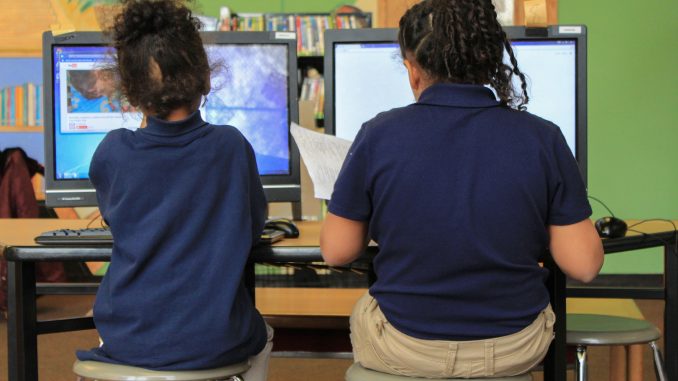
At 2 years old, Kayla Hoskinson sat on her couch reading a Dr. Seuss book.
Her mother marveled at her daughter’s ability, calling her a “genius child,” Hoskinson said. But the whole time she was holding the book upside-down.
“I had read these Dr. Seuss books so much with my mother that I had them memorized,” said Hoskinson, the children’s librarian at The Free Library of Philadelphia’s branch on Cecil B. Moore Avenue near 24th Street. “Sitting down and reading a book just builds your world.”
The Free Library of Philadelphia is the programming and managing partner for the Read by 4th campaign, with more than 90 participating organizations aiming to increase the number of Philadelphia students reading at grade level when they enter fourth grade. Less than half of Philadelphia fourth graders currently read at their grade level, Philly.com reported in February.
Temple is one of five universities partnering with the initiative.
Kristina Najera, an assistant dean in the College of Education, said Read by 4th encouraged Temple to get accredited for the Knowledge and Practice Standards for Reading, a set of guidelines for the preparation, certification and professional development for reading teachers. The standards will be implemented in the school’s curriculum and affect professors’ teaching styles.
College of Education Dean Gregory Anderson said the school’s early childhood education program is being reviewed to see if it’s eligible for the accreditation process. Classes are being assessed to see what standards are being met, and necessary changes will be made to the curriculum by Fall 2017.
“I know that this is so important because Temple is the largest provider of teachers for the School District of Philadelphia,” Najera said.
When he helps his 10-year-old son with his math homework, Anderson said his son often reads too quickly and gets confused by the questions, showing that literacy is the foundation for subjects like math and science.
“It’s the biggest gatekeeper in student success,” Anderson said.
According to the “Literacy Promotion: An Essential Component of Primary Care Pediatric Practice,” an article published by the American Academy of Pediatrics, reading with young children builds parent-child relationships and lifelong social-emotional skills. The article also reported reading proficiency by the third grade is the most important predictor of high school graduation and career success.
Diane Castelbuono, the Philadelphia school district’s deputy for early learning, said Read by 4th is the most comprehensive effort aiming to enrich the city’s education that she’s seen in the last 20 years.
She added that lack of high-quality pre-K, lack of reading materials and lack of higher education institutions teaching future educators the science of reading contribute to the disadvantages the district faces when teaching literacy.
“If colleges of education can do a much more in-depth job of teaching teachers, especially elementary grade teachers, how to teach reading and that there is a science to it, that will be really important and enable teachers when they get into our schools to hit the ground running,” Castelbuono said.
Anderson said education doesn’t stop after elementary school, and there needs to be a “continuum” of attention paid to the quality of teaching. Last month, the city received the Gaining Early Awareness and Readiness for Undergraduate Programs grant, also known as GEAR UP, from the United States Department of Education. It’s a $29 million, seven-year grant for partnerships that provide college readiness services to middle and high schools with high rates of poverty among their students.
Temple will work at six high schools and 21 middle schools in North Philadelphia in partnership with the grant. Other higher education institutes, like La Salle University and Bryn Mawr College, will also assist Philadelphia schools.
The College of Education is continuing its work in the neighborhood through other programs, like the $30 million Choice Neighborhoods Implementation Grant from the U.S. Department of Housing and Urban Development, which was awarded in 2014. Temple is the lead educational partner and works in North Central to improve pre-K opportunities and help high school students as they prepare for life after graduation.
Anderson said the College of Education’s work in the community is based off the school’s “place space initiative” — an effort to affect the education of children, families, young adults and adults in North Philadelphia positively with the College of Education’s academic programs, grants and research.
He imagines Philadelphia’s education as a pipeline, that may be broken in a few places, he said.
It starts with literacy in elementary school, and then middle school, where there may not be enough STEM programming, he said. Then students go to high school, which he said can sometimes be a “lost opportunity” for students who don’t start a career or go to college after graduation. He hopes the College of Education can help fill in those gaps.
“We see learning as a lifelong endeavor, and we have the resources to support it,” Anderson said. “We are trying to be more strategic now in North Philadelphia because that’s where Temple is and we have a special relationship with the community.”
Grace Shallow can be reached at grace.shallow@temple.edu or on Twitter @Grace_Shallow.




Be the first to comment